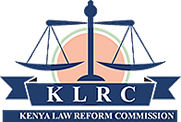KLRC was initially established in 1982 through the enactment of the Law Reform Commission Act (Chapter 3 of the laws of Kenya).The mandate of the Commission as set out in section 3 of the said Act is to “keep under review all the law of Kenya to ensure its systematic development and reform, including in particular the integration, unification and codification of the law, the elimination of anomalies, the repeal of obsolete and unnecessary enactments and generally its simplification and modernization”.
The above mandate has since been expanded by the CoK2010 which under Clause 5(6) (b) of Sixth Schedule requires the Commission for the Implementation of the Constitution (CIC) to coordinate with the KLRC and the Attorney-General (AG) to prepare for tabling in Parliament legislation required to implement the CoK2010. The implication here is that, other than its statutory and on-going role of keeping under review all the law of Kenya, KLRC now has an onerous constitutional mandate of not only preparing all the new legislation required to give effect to the CoK2010 within specified timelines, but also to undertake a detailed audit of all the existing over 700 pieces of legislation and harmonize them with the CoK2010.
The KLRC now draws its current legal mandate from three primary instruments of governance which also inform its establishment, structure and operations. These instruments are the Law Reform Commission Act (Cap 3), the State Corporations Act (Cap 446) and the CoK2010. The mandate of KLRC as given by the instruments can therefore be categorized into statutory and constitutional mandates. The statutory mandate is spelt out in the law enacted by parliament that established KLRC and provides for its internal governance structure and the omnibus legislation governing the state corporation sector. Specifically, KLRC derives its statutory mandate from Law Reform Commission Act (Cap 3) and State Corporation Act (Cap 446).
Since inception, KLRC has continued to exist as the entity established under the Law Reform Commission Act (Chapter 3 of the laws of Kenya). Notably, the focus has been on keeping all Kenyan laws under review to ensure their systematic development and reform, including, in particular their integration, unification and codification. The reform involves the elimination of anomalies, the repeal of obsolete and unnecessary enactments and general simplification and modernization of the laws. The KLRC is therefore the primary Law Reform agency in Kenya and part of its mandate is to offer technical legal advice to government agencies on the review of laws for which they take responsibility. This puts into context KLRC’s traditional mandate.
From inception, KLRC has operated as a department within the office of the AG. However upon reorganization of government ministries and functions vide presidential circulars Nos. 1 of 2008, the law reform function and the KLRC were administratively moved to the Ministry of Justice, National Cohesion and Constitutional Affairs (MoJNCCA). It is wholly funded by the Government but with regular support from development partners.
Since 2008 KLRC’s critical role in law reform has become central in the realization of the projected national development under KV2030. Given the implementation arrangements of the national vision, sharper focus on law reforms is provided for under the first medium term plan (MTP2008-2012). During the post 2007 election period, further emphasis was placed on reforming of laws as underpinned by the National Accord and Reconciliation Act, 2008. The new constitutional dispensation that set in upon promulgation of the CoK2010 placed the ultimate emphasis on law reform beginning with the express demand for construing of all laws existing immediately before its effective date. Specifically, the laws would be construed with alterations, qualifications and exceptions necessary to bring each into conformity with the CoK2010 (Article 262(7)). These mark and now put into context KLRC’s transitional mandate.
The CoK2010 as the core national policy and legal reform has underpinned Kenya’s governance and rule of law agenda. Its promulgation has brought on board a consensus based constitutional document that forms a strong basis for national renewal, stability and accelerated development that’s widely shared. Indeed the CoK2010 would then serve as the facilitator, enabler and defender of gains made across regimes intentions of which are to be mainstreamed into the various proposed legislation in its implementation. In this respect KLRC has a direct responsibility in coordinating with the CIC and the AG in the preparation and tabling in Parliament legislation required to implement the CoK2010(Article 262(6)(b). This puts into context KLRC’s constitutional mandate
The demand for KLRC to deliver on its above mandates compels it to formulate and vigorously pursue a new strategic direction aligned to the adopted government planning cycle of 2013-2017. In content, the strategic direction has been aligned to Medium Term Plan 2013-2017 (MTP2) which furthers the Kenya Vision 2030 (KV2030) aim to transform Kenya into a globally competitive and prosperous nation with a high quality of life. Across the three pillars the need for legislation and law reform is emphasized in great detail.
